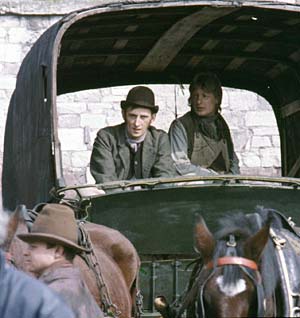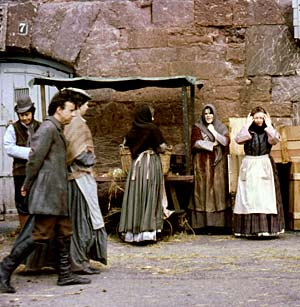
Exeter Stories
Exeter folk and friends in their own words - │ << Previous story │ Next story >> │
I was an Onedin Line extra
As dawn breaks, I arrive at a car park near the Quay, Exeter, lock the car and make my way to the salubrious dressing rooms in an old warehouse. At the top of the stairs I am greeted by a very businesslike lad who asks "Have you been fitted with a costume yet?". "No" I reply "Walk this way then please".
We pass by an assortment of clothes - a Marks & Spencer's of the 1870's, having racks of clothing of every sort, from the finest gentleman's "quality" wardrobe to the scruffiest street urchin's rags.
"Let me see now, I think you can be a docker" says my guide in this tour of Sherlock Holmes' wardrobe room. Then I was kitted out, if that be the correct expression for wearing a small hat, T type shirt, miniscule waist coat, part of a jacket (no lining), large heavyweight corduroy trousers and huge leather boots, which I later found to be the most comfortable boots to wear. Mustn't forget my neckerchief which appeared from nowhere, and was put around my neck by another assistant.
"You're finished now - off to make-up. Through that door to the left and up the flight of steps to the make-up caravan."
"Thank you." I say sceptically.
As I arrive at the caravan the door opens - out pops a pert young woman: "Are you next - well come on in. Sit down here. Do you know what you are going to be?" she enquires.
"A docker I think" is my reply.
"Oh good, we can give you sideburns" she says reaching, for a cardboard box with 'SIDEBURNS' written on all its faces.
Carefully trying one or two colours and sizes, she put a pair of sideburns on my face. A dab of mascara and make-up paint, and I am finally transformed into a docker circa 1870.
First timer
After coffee and many bacon sandwiches and hot dogs, we Extras are called. Off we go back down the steps to the Quay, and for me the first time on a TV film location set. It is very difficult to say what is going on at the time, but we finally see the whole setting and props, in the daylight. Barrels, authentic looking boxes, sacks, carts, barrows. ropes and many people in 1870s clothing are just waiting to be called or moved.
"Can I have all the Extras here please" shouts the production assistant. "I would like some of you to pick up a barrel, box or something, and just carry it across or up and down the Quay. Be careful not to get in the way of the horse and carriage as it comes down the hill, and along the Quay. This is going to be a tracking shot. so don't start until you hear the word "Action", and don't stop until you hear the word "Cut".
I start walking carrying a barrel of rum (unfortunately empty) in the opposite direction to the carriage. Remember to keep going until someone shouts "Cut". Don't turn to see if the camera has gone by I keep saying to myself.
"Background action rehearsal only" shouts the Director.
Action
"Action" - the word that means I have started on a TV career. I walk as naturally past the camera as I can, and up the hill and around the corner, stop. Then return to my original position on the instructions of the Production Assistant.
"Right, we shall have full rehearsal with the carriage and camera movements" shouts the Director. The carriage waiting around the corner is cued in by a walkie-talkie.
Everything appears ready, and the Director shouts "Action".
I start walking again, the carriage approaches and passes by. Everything was filmed and in order.
The carriage is sent away to turn around further down the Quay out of camera shot because there is not enough room where the carriage had stopped.
The noise of the crack of a spring on the carriage (a landau I think) seemed to be so loud everyone stopped what they were doing and listened. All the props men, the Production Assistant and those affected by the damage rush to the carriage. It seemed as if they had expected some breakdown. Surprisingly, it seems to me that the Director, concentrating on the shot itself, was only made aware of the incident by one of the Production Assistants. Still. there was no temperamental reaction as I had expected from theatricals. Just "Can it be repaired today"
It could, and two hours later I discovered it had been tied up with ropes in some ingenious way.
Another five or six times doing the same thing over and over again, and the scene is 'in the can'.
A coffee break is called and all of us (the Extras) make our way to the canteen caravan and eat more bacon sandwiches and drink mugs and mugs of coffee. Incidents of interest were occurring all the time, but to recount each one is impossible. A lot of non-camera time was spent getting near and talking to the stars of the series.
Although clear skies satisfied the cameraman and lighting technician, the actors and extras found that it was very cold on some days; in fact it snowed on one occasion. Towards the end of a long day, which for me started. at 5.45 a.m. when the alarm went, six of us were ordered to change into coalman's costume. This consisted of a thin pair of blue trousers and an even thinner jumper/smock. With the wind blowing at its sharpest, this made standing around while waiting for orders a very cold occupation. After standing around for about an hour in the cold, which became worse and worse because the light was fading, we were not to be used until the following morning and, therefore, could have stayed in a warm jerkin instead of freezing as we did.
When the end of the first day came at about 6.15 p.m. and someone called "Wrap" (TV terminology for finish shooting) I changed as quickly as possible and forgot about the important thing: money. Fortunately I was scheduled for work the next day and was, therefore, paid two days' pay the following night. Not all shots go as they are planned.
The next day, for instance, they wanted to unfurl the sails and obtain shots of them filling out in the wind. The sails were unfurled perfectly by the experienced crew members, but the sails did not fill out but just fell straight down motionless. The same thing happened when shots were to be taken of the Onedin Line Flag - not even the rapid twisting of the ropes holding the flag would make it flutter.
One Director, whilst explaining a particular shot explicitly, said that the word 'Christ' was not to be used. Anything else was acceptable, but definitely not 'Christ'. The reason for this was that this was a family show, to be shown on Sundays. It was not the thing.
One of my particular in-camera scenes was where we Extras who were sailors congregated around the notice where it signifies no jobs for us out of work sailors. Camera and sound rolling as we disperse from the spot someone utters the unutterable word. Immediately the Director shouts "Cut". We have to start all over again.
Not for me
Although at times I found the waiting a bore, the times of being involved and working on camera were some of the most interesting and enjoyable experiences of my life. It is a shame things have to come to an end, but I would not like to be a member of the acting profession. For all its glamour, as one actor said laconically "There are approximated 20,000 members of my trade union, but 80% of them are permanently in a transient stage".
He meant, I think, unemployed and looking for work. They call it "resting".
This article was written by Chris Dunston soon after the filming the Onedin Line in 1976 ended, and published in the Commercial Union Staff Magazine. Used with permission. Photos by Alan H Mazonowicz.
 The author is in the cart, wearing the hat.
The author is in the cart, wearing the hat.
 An action shot of a busy day for the extras.
An action shot of a busy day for the extras.
│ Top of Page │